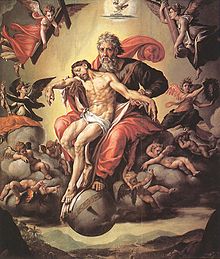- Economy of Salvation
-
 Holy Trinity, Pieter van Aelst, 16th century
Holy Trinity, Pieter van Aelst, 16th century
The Economy of Salvation is that part of divine revelation that deals with God’s creation and management of the world, particularly His plan for salvation accomplished through the Church. From the Greek oikonomia (economy), literally, "management of a household" or "stewardship".[1] Also called the Divine Economy.
It is the elements and resources revealed by God as necessary for salvation through special revelation, scriptures of the Old Testament and New Testaments. The ultimate expression of this in Christian theology according to Catholic Church teachings would be the work of salvation achieved by Jesus Christ on the cross. His sacrifice paid for our debts and therefore has made payment for our sins - and therefore we are seen as not guilty before God for our sins committed.[2]
This economy is related to a transaction:
- God gives the means of salvation through Jesus sacrifice.
- We accept it through faith and allegiance to him.
References
- ^ Mcgrath, Alister Christian Theology: An Introduction Blackwell Publishing, 2006 p. 267 ISBN 9781405153607
- ^ Confirmation in the Economy of Salvation Catechism of the Catholic Church
Further reading
- Conrad, A.C. The Divine Economy. Grand Rapids: Eerdmans, 1954.

This Christian theology article is a stub. You can help Wikipedia by expanding it.
